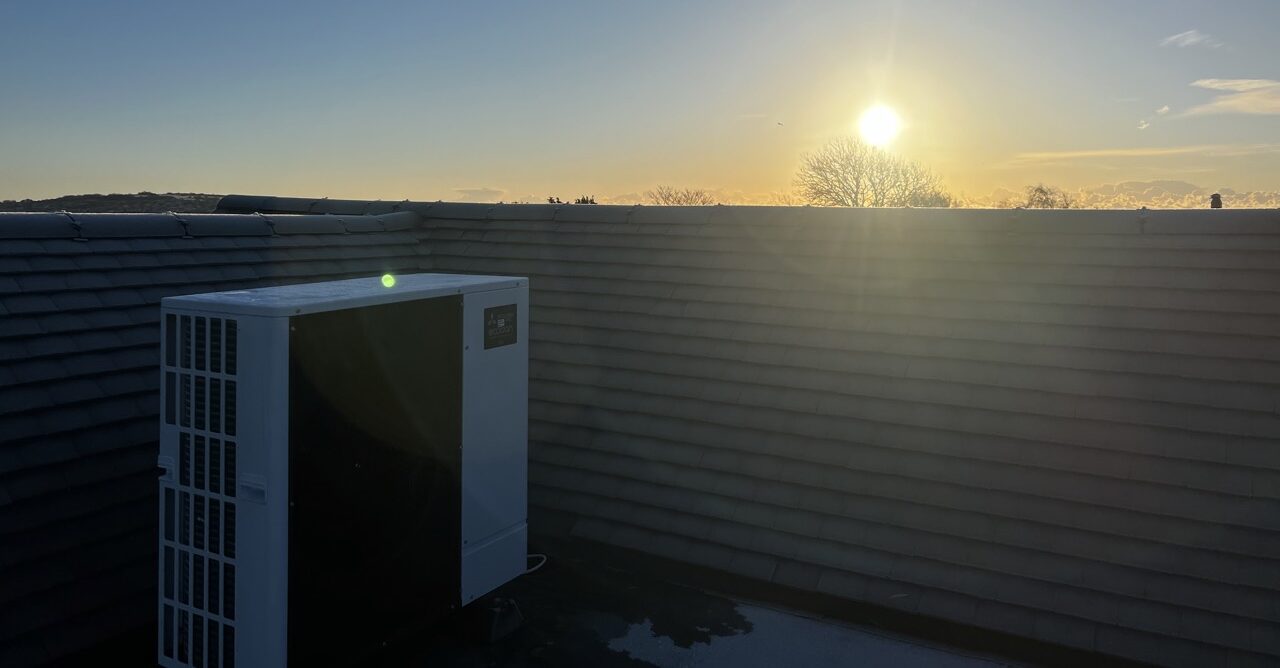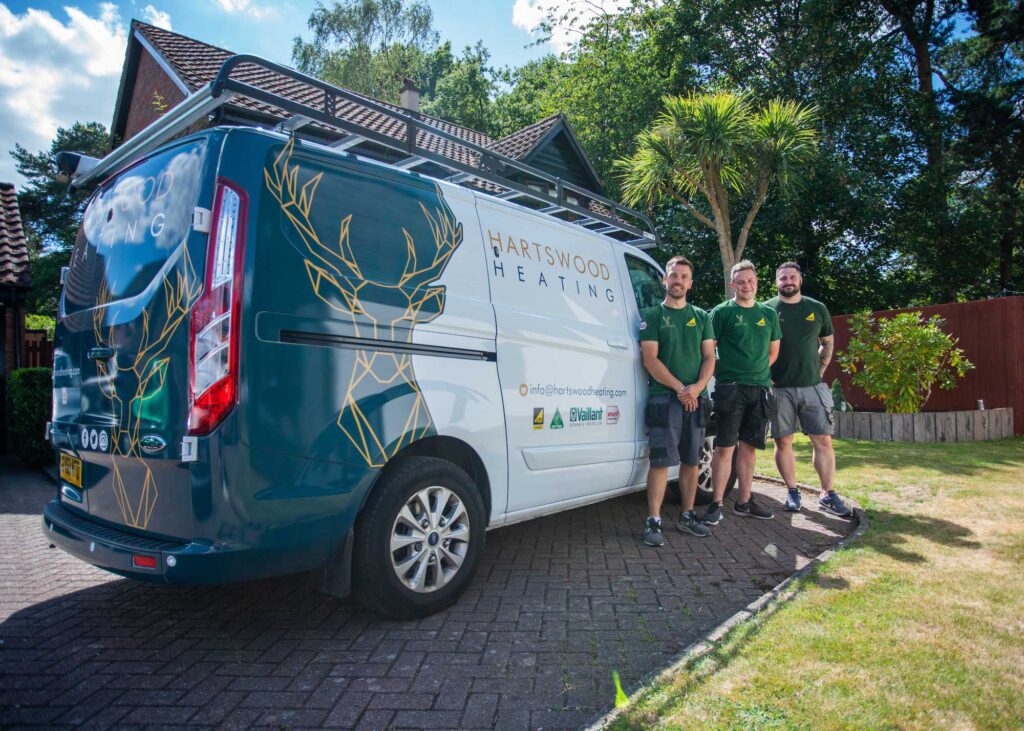

Our friendly team of Sussex heat pump installers are on hand to make sure you get the best system for you and your property.

What is a heat pump?
A heat pump is an innovative heating system that taps into the existing heat in the air or ground to provide warmth for your home. It operates on electricity but has the remarkable ability to generate up to 3.5 to 4 kilowatts (KW) of heat for every 1 kilowatt of electricity it consumes. This high efficiency makes heat pumps up to 400% efficient, beating the typical efficiency of boilers which is around 94%. Due to their excellent efficiency and reliance on renewable heat sources, heat pumps are considered a renewable technology.
How Do Heat Pumps Work?
Heat pumps work on the principle of thermodynamics and use a refrigeration cycle to transfer heat energy from one place to another. The process involves extracting heat from the air or ground using a special fluid, compressing it to make it hotter, and distributing it throughout your property via a heating system. In warmer months, heat pumps can reverse this process to remove heat from indoors and provide cooling. It’s an efficient way to keep your home comfortable all year round.
We Install Air and Ground Source Heat Pumps Across Sussex
We have a team of expert heat pump installers ready to survey your property, advise on the right type of heat pump, and get everything installed. We specialise in the two main types of heat pumps: air source heat pumps and ground source heat pumps.
Air Source Heat Pump (ASHP) Installation in Sussex
Air source heat pumps absorb heat from the air outside and use it to warm your home or business. These systems are great for properties with limited outdoor space and provide an efficient heating solution even in colder climates – they can work even at -15 degrees. These types of pumps offer flexibility, ease of installation, and cost-effectiveness which makes them a popular choice among our customers.
Ground Source Heat Pump (GSHP) Specialists in Sussex
Ground source heat pumps extract heat from the ground through a series of buried pipes filled with a heat-carrying fluid. This renewable energy source provides stable and consistent heating throughout the year. Ground source heat pumps are best for larger properties and can be installed in both residential and commercial settings. Although they need more space during installation, they offer higher efficiency and long-term savings on energy bills.
If you would like to discuss the differences between these two options and work out what is right for you then speak to our heat pump team today.
Heat Pump Grants Explained
As of April 2024, the government is currently running the Boiler Upgrade Scheme (BUS) which will contribute £7,500 towards an air source heat pump and £7,500 towards a ground source heat pump, including water source heat pumps. We are approved heat pump installers so are able to handle the application and redemption on your behalf. You can see the full details here.
Heat Pump Prices
The price of air and ground source heat pumps can vary depending on the brand, type and installation process. Most installations will cost from between £10,000 and £20,000. As of April 2024 you will receive £7500 off this price as part of the Governments BUS (Boiler Upgrade Scheme). This in effect provides a discount of 37-75%.
Heat Pump installation times
The time it takes to install heat pumps depends greatly on what type of heat pump you are having installed and the conditions into which the heat pump will be added.
On average an air source heat pump will take between 2-4 days to install. Ground source heat pumps require more time for the installation process, usually around 5-8 days. This is due to the groundwork needed to get the heat pump pipework underground at the correct depth.
Heat Pumps Sussex
We are based in Shoreham, West Sussex, and can travel to quote, install and service both types of heat pumps right across Sussex. If you are looking for a reliable and expert heat pump installer then we can help.
Whether you are looking at something for a rural property in areas such as Lewes, Ringmer, or Storrington, or something in a larger town like Horsham, Brighton or Chichester we can help. Our expert team will be able to assess your needs and the property itself and get the right heat pump system for your budget and property type.
As Government Approved heat pump installers we are here to help you change your traditional heating system into something that uses far less energy saving you money and helping the fight against climate change.
Areas we cover
Service Areas for Brighton and Hove
Service Areas for Shoreham-by-the-Sea and Lancing
Service Areas for Worthing
Why Choose Hartswood Heating When it Comes to Heat Pumps in Sussex?
At Hartswood Heating, we take great pride in our reputation as Sussex experts in heat pumps. With our extensive expertise, certified professionals, and unwavering dedication to ensuring customer contentment, we deliver exceptional service and dependable solutions.
Get in touch with Hartswood Heating today to explore the advantages of air-source and ground-source heat pumps and witness the transformative impact they can have on your heating needs.
Frequently Asked Questions
How long does a heat pump typically last?
Heat pumps are built to be durable and long-lasting. On average, a well-maintained heat pump can last between 15 to 20 years. Regular maintenance and servicing can help ensure the optimal performance and lifespan of your heat pump system.
Can a heat pump be used in conjunction with other heating systems?
Yes, heat pumps can be used alongside other heating systems. They can complement existing heating systems such as boilers or electric heaters. The heat pump can take on the primary heating load, and the secondary system can be used as a backup during extreme cold weather conditions or for specific zones in your property.
Will a heat pump reduce my energy bills?
Yes, heat pumps are highly energy-efficient and can significantly reduce your energy bills compared to traditional heating systems. Heat pumps transfer heat rather than generate it, which makes them more efficient. Depending on your current heating system and energy usage, the savings can vary, but many homeowners experience notable reductions in their energy costs after installing a heat pump.
How noisy are heat pumps?
Modern heat pumps are designed to operate quietly, providing a comfortable and peaceful environment in your home. The noise level is typically comparable to background noise from appliances like a refrigerator or an air conditioner.
What are the environmental benefits of using a heat pump?
Heat pumps offer significant environmental benefits through their use of renewable energy sources, reduced carbon emissions, high energy efficiency, and promotion of sustainable heating practices. By relying on renewable heat from the air or ground, heat pumps help combat climate change while consuming less energy compared to traditional systems. They reduce reliance on fossil fuels, use ozone-friendly refrigerants, and some even offer heat recovery capabilities to minimise waste. Overall, heat pumps contribute to a greener and more sustainable future.




